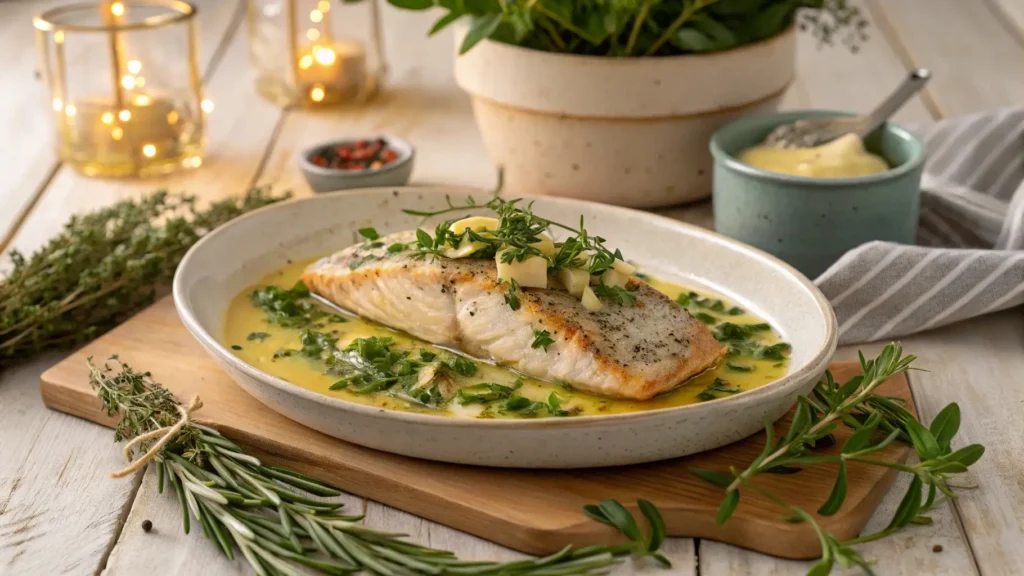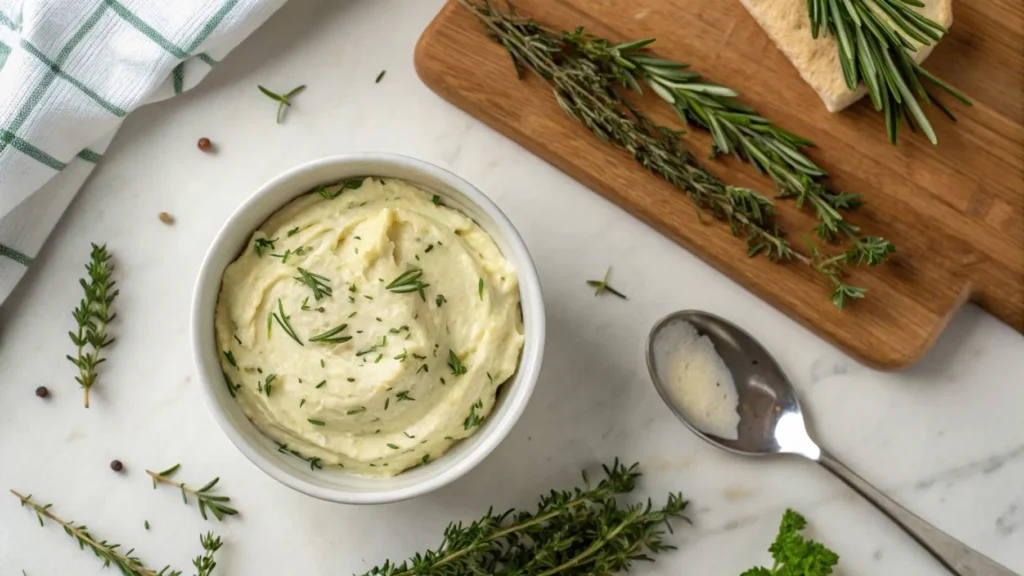Introduction to Rosemary Thyme Compound Butter for Fish Recipes
Rosemary thyme compound butter for fish is a flavorful and aromatic addition to any fish dish. This rich blend of rosemary and thyme, combined with the smoothness of butter, creates the perfect complement to delicate fish. Whether you’re grilling, baking, or pan-searing your fish, this compound butter adds depth, moisture, and an enticing fragrance that transforms a simple dish into a gourmet experience. In this article, we’ll uncover how to make rosemary thyme compound butter for fish and explore its various uses to enhance your seafood recipes. Let’s dive into the essential steps and tips.

Table of contents
Why Fresh Herbs Matter in Rosemary Thyme Compound Butter
Fresh herbs are essential for making rosemary thyme compound butter for fish. The difference between fresh and dried herbs is significant when it comes to flavor. Rosemary and thyme are aromatic herbs, and when used fresh, they release their essential oils and natural flavors. These oils not only add depth to your butter but also impart a fresh, vibrant taste that dried herbs lack. Fresh herbs have a potency that dried ones simply can’t match, making them the ideal choice for enhancing the flavor of your butter.
Rosemary offers a pine-like fragrance and a strong, woody flavor. It’s perfect for rich, savory dishes, and it complements the delicate taste of fish. Thyme, on the other hand, has a warm, earthy flavor with a slight citrus undertone, which enhances the overall flavor profile of the butter. Fresh rosemary and thyme create a perfect balance of freshness and warmth, making the compound butter a delightful topping for a wide range of fish.
How to Make Rosemary Thyme Compound Butter for Fish
Making rosemary thyme compound butter for fish is quick and simple, and the results are incredibly rewarding. Here’s a step-by-step guide that will show you how to prepare this aromatic butter:
Step 1: Soften the Butter
The first step is to soften unsalted butter at room temperature. This is important because softened butter will mix more easily with the herbs, allowing for a smooth, even consistency. Make sure the butter is soft enough to blend without being melted, as melted butter could alter the texture of the compound butter.
Step 2: Chop the Herbs
You can leave the butter out for about 30 minutes to soften, depending on the temperature of your kitchen. If you’re short on time, you can also cut the butter into small cubes to help it soften faster.
Next, take fresh rosemary and thyme, and chop them finely. The finer you chop the herbs, the more evenly they will be distributed throughout the butter. Aim for about one to two tablespoons of each herb, but feel free to adjust this to your taste preference. Freshly chopped rosemary and thyme will release their oils, ensuring that the butter is packed with flavor.
Step 3: Mix the Butter and Herbs
Now it’s time to combine the softened butter with the fresh herbs. Place the butter in a mixing bowl and add the finely chopped rosemary and thyme. Mix the ingredients until the herbs are evenly blended into the butter. You can also add a small amount of garlic or lemon zest for added flavor.
At this stage, you may also add a pinch of salt to enhance the flavor. If you prefer, you can also mix in some black pepper for a slight kick.
Step 4: Roll and Chill
After mixing the butter thoroughly, place it on parchment paper or plastic wrap and shape it into a log. This shape is convenient because it allows you to slice off just the amount you need later. Once rolled, refrigerate the butter for about an hour to allow the flavors to meld together. The chilling process helps the butter firm up, making it easier to slice.
After an hour or so, the butter will be ready to use. Slice it into rounds and place it directly on your fish just before serving.

Pairing Rosemary Thyme Compound Butter with Different Fish Types
Rosemary thyme compound butter for fish is highly versatile and pairs well with a variety of fish types. Here’s a closer look at how it complements different types of fish:
Milder Fish
For milder fish like cod or tilapia, rosemary thyme compound butter is the perfect complement. These fish have a light, subtle flavor, and the herbal butter adds just the right amount of seasoning without overpowering the fish. The rosemary and thyme enhance the natural flavor of these fish, making them more flavorful and enjoyable.
The mildness of these fish means that a small amount of compound butter will go a long way. You don’t need to add a lot of butter—just enough to provide a rich, savory layer on top.
Richer Fish
For richer fish like salmon or trout, rosemary thyme compound butter brings balance to the fatty texture of the fish. The bold, fragrant rosemary works particularly well with fatty fish, as it helps cut through the richness and adds complexity to the flavor. The thyme contributes a warm, earthy flavor that pairs beautifully with the deep taste of these fish.
Because of the richness of these fish, you can use a bit more butter to ensure the fish is fully coated and that the herbs infuse the fish with their flavors.
Firm Fish
Firm fish such as swordfish or mahi-mahi also benefit from the addition of rosemary thyme compound butter. These fish have a hearty texture that pairs perfectly with the richness of the butter. The flavors of the rosemary and thyme meld seamlessly with the dense flesh of the fish, creating a satisfying and flavorful dish.
When preparing firm fish, you can use a generous amount of compound butter to ensure it melts evenly on the fish, providing a rich, flavorful glaze.

Health Benefits of Rosemary and Thyme in Fish Recipes
Adding rosemary and thyme to your fish dishes not only enhances the flavor but also provides numerous health benefits. Let’s explore how these herbs contribute to a healthier meal:
Antioxidant Properties
Rosemary is a rich source of antioxidants, which help reduce inflammation in the body. These antioxidants neutralize harmful free radicals and help protect cells from damage. In addition to the health benefits for your heart and immune system, antioxidants also play a role in improving overall wellness.
Thyme, on the other hand, is an excellent source of vitamin C, which supports a strong immune system and promotes healthy skin. This vitamin also plays a crucial role in protecting against infections and boosting the body’s natural defense mechanisms.
Rich in Vitamins and Minerals
Both rosemary and thyme provide essential vitamins and minerals. Rosemary contains a good amount of vitamin A, which is important for eye health, and iron, which supports healthy blood circulation. Thyme provides manganese, which is crucial for bone health, and iron, essential for carrying oxygen throughout the body.
By incorporating these herbs into your fish dishes, you’re not only improving the flavor but also boosting the nutritional value of your meal. The benefits go beyond just taste—they help promote overall health.
Antimicrobial Benefits
Both rosemary and thyme have antimicrobial properties, meaning they help protect against harmful bacteria and viruses. These properties help improve digestion and support a healthy gut microbiome. Adding fresh rosemary and thyme to your fish recipes can aid in digestion and provide natural antibacterial protection for your body.
Creative Variations of Rosemary Thyme Compound Butter for Fish Recipes
While the classic rosemary thyme compound butter for fish is delicious on its own, there are many ways to customize it for a unique flavor experience. Here are a few creative variations:
Add Citrus for Freshness
To give your compound butter a zesty twist, add some lemon zest or lime juice. The citrus flavors brighten up the herbal notes and pair wonderfully with lighter fish like cod or halibut. This variation is perfect for warm weather dishes or seafood served on the grill.
Add Spice for a Kick
If you like your food with a little heat, consider adding red pepper flakes or cayenne pepper to your compound butter. The spiciness balances the richness of the butter and complements the herbal flavors of the rosemary and thyme. This version is perfect for those who enjoy bold flavors with a little bit of a bite.
For a Richer Butter
For a creamier, richer butter, mix in a bit of cream cheese or Greek yogurt. This variation works great with heartier fish like salmon or swordfish. The creaminess adds a smooth texture that pairs well with the thick fish.
Try Other Herbs
You can also add other herbs to your compound butter. Parsley brings a fresh, green flavor, while basil adds a touch of sweetness. Garlic or shallots can deepen the flavor profile, making it more savory. The combinations are endless, allowing you to tailor the butter to your exact preferences.
Looking for more ways to season your fish? Check out our delicious Hillbilly Fish Fry Seasonings Recipe for a unique flavor twist.
Common Mistakes to Avoid When Making Rosemary Thyme Compound Butter
To make sure your rosemary thyme compound butter turns out perfectly every time, here are some common mistakes to avoid:
Using Dried Herbs
While dried herbs are convenient, they don’t pack the same punch as fresh herbs. For optimal flavor, it’s best to use fresh rosemary and thyme. Dried herbs tend to be less potent, so they may not infuse the butter as well as fresh ones.
Overmixing the Butter
Overmixing the butter can cause it to become too soft and lose its structure. Mix only until the herbs are evenly distributed. This will help maintain a good consistency and make the butter easier to handle.
Using Salted Butter
Always use unsalted butter to control the amount of salt in your compound butter. Salted butter can make the final product too salty, which can overpower the delicate flavors of the fish. Feel free to adjust the salt according to your preference after preparing the dish.
Skipping the Chilling Step
Chilling the butter after mixing allows the flavors to blend and ensures it firms up, making it easier to slice. Skipping this step may result in a butter that is too soft to work with.
Conclusion
Rosemary thyme compound butter for fish is an easy way to add vibrant, herbal flavors to your seafood dishes. It’s quick to make and can be stored for later use, making it a convenient and flavorful addition to your kitchen. By using fresh rosemary and thyme, you not only enhance the taste of your fish but also benefit from the healthful properties of these herbs. Whether you prefer mild, rich, or firm fish, rosemary thyme compound butter complements them all. With creative variations and a few simple adjustments, you can customize this compound butter to suit your tastes perfectly.
FAQS
Can you mix rosemary and thyme?
Yes, rosemary and thyme can be mixed. Together, they create a balanced, aromatic flavor that complements a variety of dishes, including fish.
What butter is best for fish?
Unsalted butter is the best choice for fish. It allows you to control the amount of salt and lets the natural flavors of the fish and herbs shine.
How long does compound butter with fresh herbs last?
Compound butter with fresh herbs lasts about 1 to 2 weeks when stored in the refrigerator. You can also freeze it for longer storage, up to 3 months.
How to use rosemary, sage, and thyme?
Rosemary, sage, and thyme can be used in various ways. Add rosemary to grilled meats, sage to stuffing, and thyme to soups, sauces, or roasted vegetables. They can also be mixed into compound butters for flavorful fish dishes.

1 thought on “Rosemary Thyme Compound Butter Recipe for Fish – Easy One”